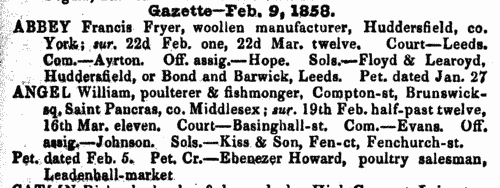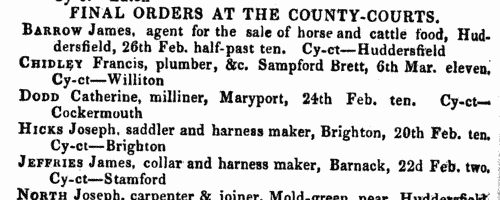Swift Surname Ancestry ResultsOur indexes 1000-1999 include entries for the spelling 'swift'. In the period you have requested, we have the following 1059 records (displaying 701 to 710): Single Surname Subscription | | | Buying all 1,059 results of this search individually would cost £6,072.00. But you can have free access to all 1,059 records for a year, to view, to save and print, for £100. Save £5,972.00. More... |
These sample scans are from the original record. You will get scans of the full pages or articles where the surname you searched for has been found. Your web browser may prevent the sample windows from opening; in this case please change your browser settings to allow pop-up windows from this site. Anglican Clergy in England and Wales
(1858)
The Clergy List for 1858 includes this comprehensive list of Anglican clergymen in England and Wales, whether beneficed or not. The names are arranged alphabetically by surname, and christian name or initials, with degree, and current office.SWIFT. Cost: £4.00.  | Sample scan, click to enlarge

| Assignments of bankrupts' estates in England and Wales
(1858)
Perry's Bankrupt and Insolvent Gazette, issued monthly, included lists of assignments of bankrupts' estates. Each entry gives the name of the bankrupt (surname first, in capitals), the date (in brackets), address and trade; followed by the names and addresses of the trustees to whom the estate was delivered, and the name and address of the solicitor. This is the index to the names of the bankrupts, from the issues from January to December 1858.SWIFT. Cost: £6.00.  | Sample scan, click to enlarge

| Bankrupts
(1858)
Bankruptcy notices for England and Wales: bankruptcy often caused people to restart their lives elsewhere, so these are an important source for lost links
SWIFT. Cost: £6.00.  | Sample scan, click to enlarge

| Bankrupts in England and Wales
(1858)
Perry's Bankrupt and Insolvent Gazette, issued monthly, included lists of bankruptcies and stages in the liquidation of the estate, payment of dividends, and discharge. The initial entry in this sequence gives the name of the bankrupt (surname first, in capitals), the date gazetted, address and trade (often with the phrase dlr. and ch., meaning dealer and chapman); the dates and times and courts of the official processes of surrender; the surname of the official commissioner (Com.); the surname of the official assignee; and the names and addresses of the solicitors; the date of the fiat; and whether on the bankrupt's own petition, or at the demand of petitioning creditors, whose names, trades and addresses are given. In subsequent entries the bankrupt is often merely referred to by name and trade. This is the index to the names of the bankrupts, from the issues from January to December 1858, which may or may not include the detailed first entry for any particular individual.SWIFT. Cost: £6.00.  | Sample scan, click to enlarge

| Insolvents in England and Wales
(1858)
Perry's Bankrupt and Insolvent Gazette, issued monthly, included lists of insolvencies and stages in the process whereby the insolvents petitioned for release from debtors' prison. The insolvent is generally referred to by name (surname first), address and trade. This is the index to the names of the insolvents, from the issues from January to December 1858.SWIFT. Cost: £6.00.  | Sample scan, click to enlarge

| Scottish Bankrupts
(1858)
Perry's Bankrupt and Insolvent Gazette, issued monthly, included lists of sequestrations of Scottish bankrupts' estates. The initial entry gives the name of the bankrupt (surname first, in capitals), trade and address; the dates and place of the stages of the sequestration process, and the date by which claims against the estate were to be lodged. This is the index to the names of the bankrupts, from the issues from January to December 1858: it also covers dissolutions of partnerships in Scotland, and the names of trustees, assignees, attorneys &c. mentioned in these Scottish cases.SWIFT. Cost: £6.00.  | Sample scan, click to enlarge

|  Members of the British military train fighting in China
(1856-1860) Members of the British military train fighting in China
(1856-1860)
The China Medal was awarded to soldiers and sailors who took part in the prosecution of the war against the Chinese from 1856 to 1860. Separate clasps were awarded for men who had been in receipt of the China Medal of 1842; for being actually present at Canton on 28 and 29 December 1857, when that city was bombarded and finally captured; for being actually engaged in the operations which ceased with the first capture of the Taku Forts, 20 May 1858, and led to the Treaty of Tientsin; for being actually present at the capture of the Taku Forts 21 August 1860; and for being actually present before Pekin the day the gate of that city was given up to the allied (British and French) army, viz. on 13 October 1860. Among the recipients of the medals were members of the Military Train.SWIFT. Cost: £8.00.  | Sample scan, click to enlarge

|  Sailors and marines on board Her Majesty's ship Adventure
(1856-1860) Sailors and marines on board Her Majesty's ship Adventure
(1856-1860)
The China Medal was awarded to soldiers and sailors involved in the various actions of the war against China, in which this ship was engaged from 1856 to 1860. The medals were either delivered on board or sent on in 1862: except that many of the men were no longer immediately traceable, and the remarks on the roll show that some medals were not sent on for several years, and some were never sent. After the main roll there is a section showing which of the men also qualified for clasps. Separate clasps were awarded for men who had been in receipt of the China Medal of 1842; for the taking of Fatshan in 1857, Canton in 1857, Taku Forts in 1858, Taku Forts in 1860, and Pekin in 1860. Most of the men on this ship are shown as having been given the the Taku Forts 1860 clasp, for being actually present at the capture of the Taku Forts 21 August 1860.SWIFT. Cost: £8.00.  | Sample scan, click to enlarge

|  British infantry fighting in China
(1860) British infantry fighting in China
(1860)
The China Medal was awarded to soldiers and sailors who took part in the prosecution of the war against the Chinese from 1856 to 1860. Separate clasps were awarded for men who had been in receipt of the China Medal of 1842; for being actually present at Canton on 28 and 29 December 1857, when that city was bombarded and finally captured; for being actually engaged in the operations which ceased with the first capture of the Taku Forts, 20 May 1858, and led to the Treaty of Tientsin; for being actually present at the capture of the Taku Forts 21 August 1860; and for being actually present before Pekin the day the gate of that city was given up to the allied (British and French) army, viz. on 13 October 1860. The 99th (Lanarkshire) Regiment of Foot, based at Cork, embarked for India in September 1858, and was transferred to China in 1860; moved to South Africa in 1865, and returned to England in 1869. The regiment took part in the capture of Pekin.SWIFT. Cost: £8.00.  | Sample scan, click to enlarge

|  British infantry fighting in China
(1860) British infantry fighting in China
(1860)
The China Medal was awarded to soldiers and sailors who took part in the prosecution of the war against the Chinese from 1856 to 1860. Separate clasps were awarded for men who had been in receipt of the China Medal of 1842; for being actually present at Canton on 28 and 29 December 1857, when that city was bombarded and finally captured; for being actually engaged in the operations which ceased with the first capture of the Taku Forts, 20 May 1858, and led to the Treaty of Tientsin; for being actually present at the capture of the Taku Forts 21 August 1860; and for being actually present before Pekin the day the gate of that city was given up to the allied (British and French) army, viz. on 13 October 1860. The 44th (The East Essex) Regiment of Foot, based at Colchester, having returned from the Crimea, embarked for India 26 August 1857, and was transferred thence to China. The regiment took part in the capture of the Taku Forts.SWIFT. Cost: £8.00.  | Sample scan, click to enlarge

|
Research your ancestry, family history, genealogy and one-name study by direct access to original records and archives indexed by surname.
|













